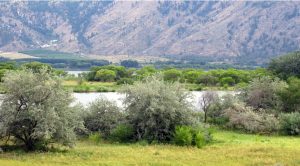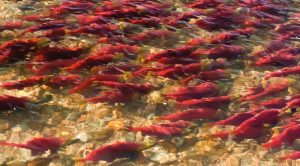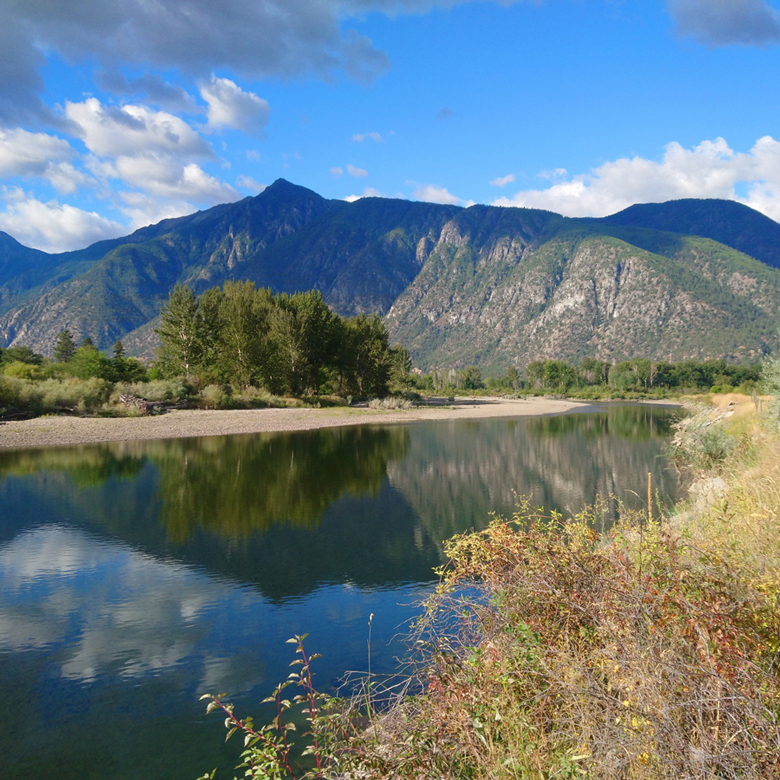Conference Themes
revitalizing salmon stocks

Confluence of the Okanagan & Columbia Rivers
The Syilx Okanagan Nation has spearheaded a 20+ year effort to revitalize salmon in the Okanagan River, the last major tributary of the Columbia River that salmon can access below the dams that stopped all salmon migration upstream in the 1940s.
The vital support of US tribal relations has heightened how important principles of collaboration and cooperation are in responding to the globalization of our planet and care of her resources. Together, with our tribal allies across this imposed international boundary, the Syilx Okanagan Nation was able to save Okanagan sockeye salmon from near extinction to celebrated returns of up to 500,000 salmon annually.
kł cp̓əlk̓ stim̓: BRINGING THE SALMON HOME

Return of the sc’win Okanagan sockeye salmon
For more than 80 years, salmon have been blocked from returning to the Canadian portion of the upper Columbia River. Now, an Indigenous-led collaboration of the Syilx Okanagan Nation, Ktunaxa Nation, and Secwépemc Nation, together with the governments of Canada and British Columbia, is working to return salmon stocks to the full length of the Columbia River.
On the U.S. side of the border major efforts also led by tribes are underway to restore salmon above Grand Coulee dam. We face challenges include habitat loss, overfishing, pollution, politics, climate change, and of course the dams. But, for Indigenous Nations, this work is not only a possibility—it is a sacred responsibility. We must take these opportunities now to move us forward, together, into a future that will sustain the people-to-be.
Conference Details
Date: November 17-18, 2021
Time: 9:00 a.m. – 12:00 p.m.
Location: Virtual (via Zoom)
*Conference program is in development and will be posted once confirmed.

Salmon Ceremony above Enloe Dam (Photo credit: Okanagan Nation Alliance)
Message from the Host Nation
The Okanagan Nation Alliance (ONA) has been participating in ‘One River, Ethics Matter’ since the first session in Spokane in 2014. These gatherings have been opportunities to feel the reality of One River, the impacts of the Columbia River Treaty, and to share stories that are familiar to fellow tribes all along the Columbia from the estuary to the headwaters and other tributaries. As the Indigenous people of the Columbia Basin, we have all been salmon people, tied to the river as sustenance and as a sacred relation. We have survived the devastating impacts of colonization to our lands, resources, and peoples and continue to assert our rights to self-determination and to work for social justice.
Syilx Okanagan Perspective
tmixw – that which gives us life – is the Nsyilxcn word that most closely translates as “ecology.” tmixw includes everything that is alive: the land, water, insects, people, animals, plants and medicines.
“Water is life. Water is our relation. Water bonds us to our ancestry, our descendants and our land.”
Excerpt from the Syilx Nation Siwɬkʷ (Water) Declaration, July 31, 2014
Additional Resources
-
- Historic Agreement Reached Between Columbia River Basin Indigenous Nations, Canada and British Columbia to Collaborate on Salmon Re-Introduction (July 29, 2019)
- Canada and United States launch negotiations to renew Columbia River Treaty (May 22, 2018)
- Syilx Water Declaration (July 31, 2014)
- Bringing the Salmon Home: The Columbia River Salmon Reintroduction Initiative
- Ethics & Treaty Project
- UBC Declaration on the Climate Emergency
Quick facts
- The construction of the Grand Coulee Dam in the 1930s and 1940s in the state of Washington blocked salmon from reaching the Upper Columbia River in Canada leading to the extirpation of salmon stocks.
- In 1964, Canada and the United States implemented the Columbia River Treaty to develop the hydroelectric potential of the Columbia River Basin and to manage flood risk.
- Either Canada or the US can unilaterally terminate most of the provisions of the Columbia River Treaty anytime after September 16, 2024, providing at least ten years’ notice is given. On or before September 16, 2014 was the earliest either party could give 10 years’ notice.
About the conference
One River, Ethics Matter is an annual conference facilitated by the Ethics and Treaty Project.
Grounded in respectful dialogue with a goal to increase public understanding, the conference explores the Columbia River Treaty and remedial options on various topics linked to the Columbia River Basin, including: treaty renewal, restoring salmon and the river, youth and climate change, and the Indigenous-led work of kł cp̓əlk̓ stim̓ – restoring ntytyix (salmon) to the Okanagan River and the Upper Columbia.
The conference is held in different cities each year, alternating between the United States and Canada. The 2021 conference is co-hosted by the Okanagan Nation Alliance and the University of British Columbia’s Okanagan campus.
Organizing Committee
- Jenny Matechuk | Events and Engagement Officer, UBC Okanagan
- Dr. John Osborn, MD | Center for Environmental Law & Policy | Ethics and Treaty Project
- Tom Soeldner | Sierra Club, Upper Columbia River Group (Spokane, WA)
- Pauline Terbasket | Executive Director, Okanagan Nation Alliance
- Marni Turek | Watershed Management Research Extension Facilitator, UBC Okanagan
- Adrienne Vedan | Director, Aboriginal Programs & Services, UBC Okanagan
- Dr. John Wagner | Associate Professor (Anthropology), UBC Okanagan

